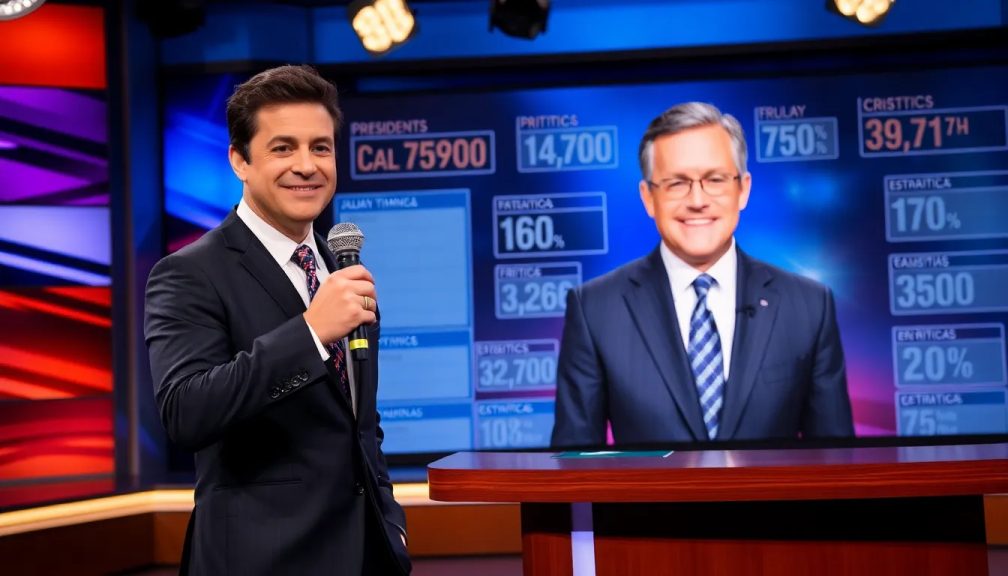Jimmy Kimmel returns and criticizes FCC chairman for Republicans

In a recent episode of his late-night show, Jimmy Kimmel addressed the political landscape with a sharp sense of humor, highlighting the ongoing tensions between media, politics, and free speech. His commentary not only shed light on current events but also sparked discussions about the role of satire in a democratic society. As Kimmel returned to the screen, he didn’t hold back in critiquing the actions of the FCC chairman, making headlines in the process.
- Jimmy Kimmel's sharp critique of FCC Chairman
- The role of satire in political discourse
- Noteworthy guest appearances and sketches
- Impact of Kimmel's return on the television landscape
- Understanding the political response to Kimmel's commentary
- The future of late-night comedy in a changing political landscape
Jimmy Kimmel's sharp critique of FCC Chairman
During his latest monologue, Kimmel made headlines by stating, "I don't think I've ever said this before, but Ted Cruz is right." This unexpected endorsement came as he criticized FCC Chairman Brendan Carr for his recent comments. Kimmel referenced Carr's threat, describing it as "a direct violation of the First Amendment" and questioning its intelligence. He humorously compared Carr's public threat to the kind of intimidation one might expect from a mobster, suggesting that such statements should be made discreetly.
Kimmel remarked, "If you want to hear a mob boss make a threat like that, you have to hide a microphone in a deli." This analogy was not just comedic; it highlighted the absurdity of public threats made by a figure in such a significant position. The late-night host's ability to mix humor with serious critique is what keeps his audience engaged and prompts them to think critically about the issues discussed.
In a twist, Kimmel pointed out Carr's previous stance on political satire, recalling a 2022 post where Carr had lauded it as "one of the oldest and most important forms of free speech." This contradiction in Carr's statements raises questions about the consistency of his views and the implications for free expression in media.
The role of satire in political discourse
Satire has long been a powerful tool in political commentary, serving as a means to challenge authority while simultaneously entertaining audiences. Kimmel's use of humor to address serious topics reflects a broader trend in media where comedians take on the role of social commentators.
Several key points about satire in political discourse include:
- Engagement: Humor can draw in audiences who might otherwise disengage from political discussions.
- Critical Reflection: Satirical commentary encourages viewers to reflect on the absurdities and injustices in political systems.
- Resistance to Censorship: Comedians often challenge censorship, pushing back against attempts to suppress free speech.
Kimmel exemplifies this approach, using humor to critique actions that threaten free speech, effectively engaging his audience in deeper discussions about the implications of these actions on democracy.
Noteworthy guest appearances and sketches
In a memorable segment, actor Robert De Niro joined Kimmel on stage, portraying an unnamed FCC chairman in a comedic skit. De Niro's character delivered a tongue-in-cheek message about the state of free speech, saying, "Speech ain't free no more; we're charging by the word now." This humorous portrayal served to underscore the serious implications of the current political climate, where free speech is increasingly under scrutiny.
The sketch highlighted the absurdity of a scenario where speech criticizing a political figure could lead to severe consequences. De Niro's comedic delivery, combined with Kimmel's incisive commentary, made for a thought-provoking moment that resonated with viewers.
Impact of Kimmel's return on the television landscape
Kimmel's return to television comes amidst significant changes in the broadcasting landscape, particularly with his show not being aired on 66 ABC affiliates operated by Sinclair and Nexstar. This decision effectively removed Kimmel from 20% of the country, a notable shift for a program that has been a staple of late-night television for nearly 23 years.
Kimmel expressed his concerns about this sudden change, stating, "After almost 23 years on the air, we're suddenly not being broadcast in 20 percent of the country." This situation raises questions about the power dynamics in media ownership and the impact of corporate decisions on content accessibility.
Understanding the political response to Kimmel's commentary
The political ramifications of Kimmel's commentary extend beyond entertainment. His critique of Carr and the broader landscape of political discourse has elicited responses from various political figures, including former President Donald Trump.
Recently, Kimmel faced backlash for a monologue addressing a tragic event involving a young man and political motivations. He clarified his intentions, stating, "It was never my intention to make light of the murder," emphasizing that his comments were meant to critique the politicization of violence rather than to assign blame to any specific group.
This incident exemplifies the challenges faced by comedians and commentators who navigate sensitive topics in a polarized political environment.
The future of late-night comedy in a changing political landscape
The intersection of comedy, politics, and free speech continues to evolve, especially in the current social climate. As late-night hosts like Kimmel tackle pressing issues, they not only entertain but also provoke thought and discussion among their viewers. The impact of these programs on public opinion and political engagement is significant, as they offer a unique perspective on contemporary issues.
As audiences demand more insight into political matters, the role of late-night comedy may become increasingly vital in shaping public discourse. The ability of hosts to balance humor with serious commentary will determine their influence in the coming years.
For those interested in Kimmel's latest commentary, you can watch a related discussion on YouTube, which further explores the themes he addressed on his show:
As the dialogue around free speech and political accountability continues, Kimmel's platform remains an essential space for critical engagement and reflection on the evolving dynamics of power in America.




Leave a Reply